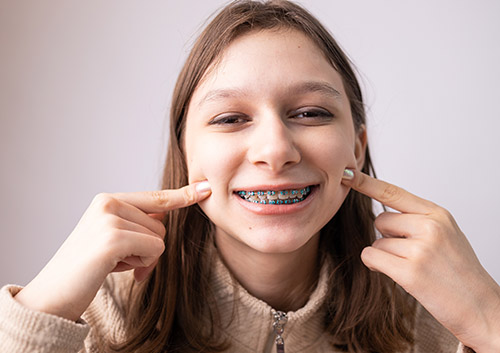October Is Orthodontic Health Month!
October 16th, 2025

October’s here! A month when we celebrate the beauty of fall, the taste of pumpkin spice, the fun of Halloween in West Bend, WI, and the healthy smiles which orthodontic treatment makes possible!
Because October is Orthodontic Health Month, and it’s a great time to talk about how your orthodontist helps you create not just a more beautiful smile, but a healthier one.
Straight, evenly spaced teeth are the visible benefit of treatment, but there are many health benefits which might not be quite as noticeable. Orthodontic treatment can:
- Help You Prevent Cavities and Gum Disease
When teeth are crowded or crooked, it’s hard for your toothbrush and floss to reach all of the plaque which builds up on and between your teeth. The bacteria in plaque create acids which start to dissolve tooth enamel. And a very small hole in the enamel surface can grow until it becomes a cavity.
Plaque and bacteria also irritate the gums. When you can’t remove plaque completely, your gums are at risk for gingivitis. This early stage of gum disease causes redness, tenderness, swelling, and bleeding. Left untreated, gingivitis can develop into more serious gum disease.
And, over time, plaque hardens and becomes tartar, which needs to be removed professionally at Pioneer Dental.
When your teeth are straight and evenly spaced, brushing and flossing are both easier and more effective, helping you keep your teeth and gums healthy and plaque-free.
- Create a Better Bite
For a healthy bite, your teeth and jaws need to align correctly. The top teeth should slightly overlap the lower teeth, and the ridges of your upper molars should fit smoothly with the grooves of your lower molars.
Malocclusions, or bad bites, can come in many forms, including overbites, underbites, open bites, cross bites, and overjets. A bad bite is bad for your dental health. Malocclusions can cause tooth grinding, worn enamel, and even cracked teeth.
And bad bites don’t just affect your teeth. When your bite doesn’t align properly, you might suffer from problems such as headaches, jaw pain, indigestion, and sleep apnea.
Orthodontic treatment creates a healthy, symmetrical, and pain-free bite.
- Improve Your Self-Confidence
We can’t forget the invisible health benefits of orthodontic treatment! Your smile is a gift which you share with the world. But if you’re hesitating to smile because of self-consciousness about your teeth or bite, orthodontic treatment can make a world of difference.
Your orthodontist can help you achieve straighter teeth, a bite which fits together properly, and, when malocclusions affect jaw symmetry, a more balanced facial profile. If you’re concerned about the appearance of your smile, talk to Dr. Carl Meyers about an orthodontic consultation. Today’s technology can even let you see what your future smile will look like!
Modern orthodontic treatment is more effective and takes less time to complete than ever before. And orthodontics offers patients of all ages more benefits than ever before:
- New types of braces are less noticeable and more comfortable than older styles. Smaller brackets, brackets which blend with tooth enamel, clear aligners, and lingual braces give you a variety of options to customize your treatment.
- Early orthodontic treatment can guide jaw growth in younger children.
- Appliances can help with jaw alignment in older children, or, for more serious malocclusions, an orthodontist can coordinate treatment with an oral surgeon.
- Treatment isn’t limited to the teen years. Adults make up a large and growing number of orthodontic patients.
If you’ve been considering orthodontic treatment, October—or any month!—is a great time to schedule a visit with an orthodontist. An orthodontic evaluation will let you know just what your orthodontist can do to help you create a beautiful and healthy smile.






